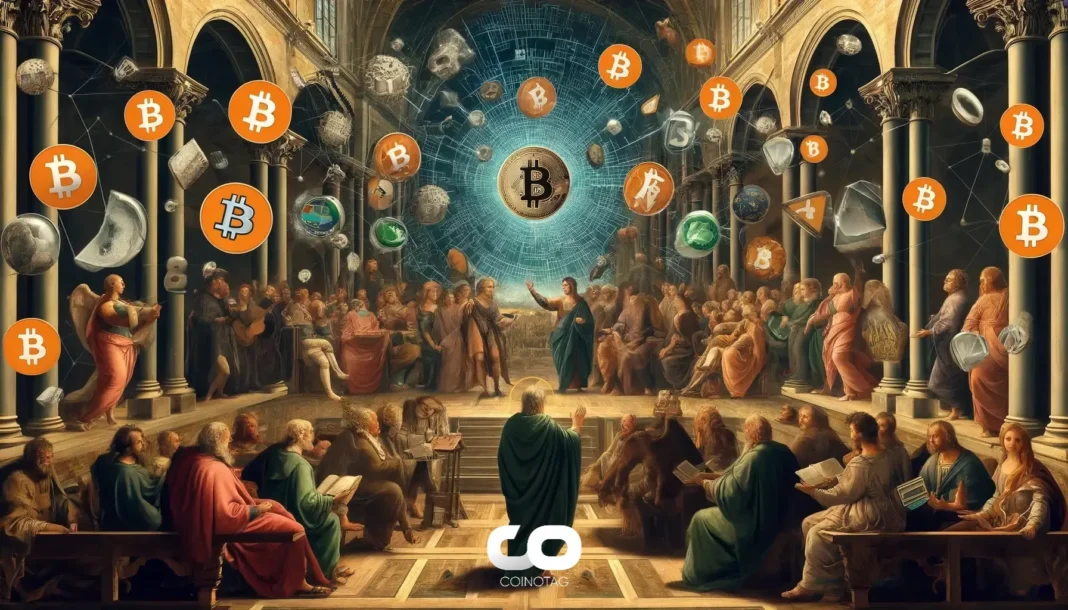-
Michael Saylor reaffirms Bitcoin’s unique position as the ultimate monetary asset, distinguishing it clearly from other cryptocurrencies.
-
His classification of Bitcoin as “money” rather than “credit” challenges prevailing market perceptions and underscores Bitcoin’s fundamental value proposition.
-
According to COINOTAG, Saylor’s perspective is shaping institutional investment strategies and influencing regulatory discussions worldwide.
Michael Saylor’s renewed emphasis on Bitcoin as supreme money reshapes market views and institutional adoption amid evolving regulatory landscapes.
Michael Saylor’s Definitive Stance on Bitcoin as the Supreme Monetary Asset
Michael Saylor, Founder and Executive Chairman of MicroStrategy, has once again underscored Bitcoin’s unparalleled status in the financial ecosystem by stating, “Bitcoin is money. Everything else is credit.” This assertion not only reiterates Bitcoin’s role as a store of value but also highlights its distinction from other cryptocurrencies, which he categorizes as forms of credit or debt instruments. Saylor’s viewpoint resonates strongly within institutional circles, where Bitcoin is increasingly viewed as a form of perfected capital—capital that is programmable, incorruptible, and scarce. This framing elevates Bitcoin beyond a mere speculative asset, positioning it as a foundational monetary instrument with significant implications for portfolio management and treasury strategies.
Impact on Institutional Investment and Market Perception
Saylor’s classification influences how institutional investors evaluate digital assets. By differentiating Bitcoin as money, he implicitly challenges the valuation models applied to altcoins, which are often treated as equity-like or credit-based assets. This distinction encourages a reassessment of risk profiles and asset allocation strategies, particularly for corporations seeking to hedge against inflation or diversify reserves. MicroStrategy’s pioneering approach to Bitcoin investment has set a precedent, prompting other firms to consider Bitcoin as a legitimate treasury asset. Market analysts note that Saylor’s rhetoric may accelerate institutional adoption, driving increased demand and liquidity in Bitcoin markets.
Regulatory and Policy Implications of Bitcoin’s Monetary Status
Saylor’s framing of Bitcoin as a monetary asset also carries weight in regulatory discussions. Governments and financial regulators worldwide are grappling with how to classify cryptocurrencies within existing legal frameworks. Recognizing Bitcoin as money rather than a security or commodity could simplify regulatory compliance and foster clearer guidelines for institutional participation. This shift may encourage policy makers to develop frameworks that support Bitcoin’s integration into the global financial system, potentially influencing taxation, custody, and reporting standards. Industry experts suggest that such regulatory clarity would reduce uncertainty, thereby enhancing investor confidence and market stability.
Bitcoin’s Role in Shaping Future Financial Infrastructure
Beyond immediate market effects, Saylor’s perspective highlights Bitcoin’s potential to redefine financial infrastructure. As a decentralized, incorruptible asset, Bitcoin challenges traditional monetary systems and offers an alternative to fiat currencies vulnerable to inflation and political interference. Its programmable nature opens avenues for innovative financial products and services, including digital contracts and decentralized finance applications. Analysts emphasize that Bitcoin’s growing acceptance as “digital gold” could catalyze broader adoption of blockchain technologies, fostering transparency and efficiency in financial transactions globally.
Conclusion
Michael Saylor’s reaffirmation of Bitcoin as the supreme monetary asset reinforces its unique position within the cryptocurrency landscape. By distinguishing Bitcoin from other digital assets as true money, he influences institutional investment strategies and regulatory approaches alike. This perspective not only bolsters Bitcoin’s market credibility but also signals a potential shift in global financial paradigms. As regulatory frameworks evolve and institutional adoption grows, Bitcoin’s role as a cornerstone of digital capital appears increasingly secure, offering investors a resilient store of value amid economic uncertainty.




